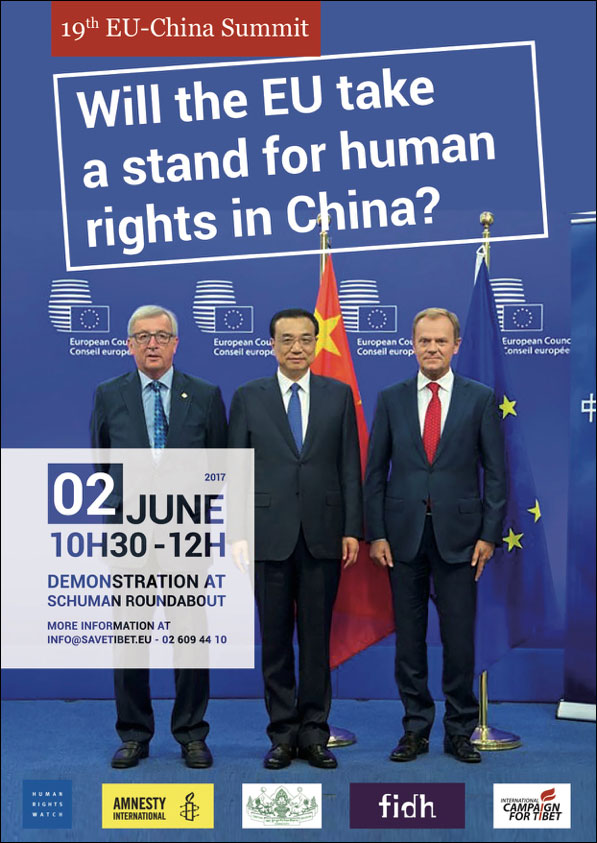
Poster for the rally organized by ICT and other NGOs in the margins of the 19th EU-China Summit on 2 June 2017. (Photo: ICT)
A highly negative consequence of Beijing’s strategy has been the cancellation of the EU-China annual Human Rights Dialogue in 2016, due to the inability of the EU member states to find a common position on China’s demand to downgrade the level of this exchange. We have cosigned a joint letter with other NGOs, calling upon EU leaders to “lead the EU and its member states in demonstrating unified and unambiguous commitment to promoting human rights in China”. On the day of the EU-China summit on June 2 (2016), we organized, together with a coalition of NGOs, a rally in front of the EU institutions, which gathered over 200 people, including Tibetans, Uyghurs and European activists, calling on the EU to take a strong stand on the deteriorating human rights situation in the PRC. Finally, we welcomed the remarks given after the summit by the President of the European Council Donald Tusk saying that he had raised human rights issues with Prime Minister Li Keqiang including the situation of “minorities such as Tibetans and Uighurs”. It was also announced that the EU-China dialogue would finally take place – which it did, although at a downgraded level, setting an inacceptable precedent for future dialogues.
The effects of the Chinese “divide and rule” strategy in Europe are now also visible at the United Nations level, as shown by the Greeks’ decision to block an EU statement critical of China’s human rights record at the 35th session of the Human Rights Council this June. This development has, in my opinion, greatly damaged the EU’s credibility as a defender of human rights and undermined its efforts toward bringing positive change in China. It prompted us to write to the Greek Minister of Foreign Affairs, reminding him of his country’s commitment to human rights and obligation to cooperate with his European partners. In addition, we have sent letters to all the other EU member states, urging them to promote EU unity on the necessity to continue highlighting China’s abysmal human rights in international fora.
At the recent session of the Human Rights Council this September, the EU managed this time to deliver a statement on China’s human rights situation on behalf of all its member states, which also directly referred to the case of detained Tibetan language advocate Tashi Wangchuk. It was a relief, but the fight is far from over; as China’s political and economic influence continues to grow, more and more countries will be tempted to shy away from criticizing Beijing for fear of economic retaliation, and there will probably be other attempts to block such statements in the future. My office in Brussels, as well as other offices of the International Campaign for Tibet in Europe will therefore strengthen their efforts both at the EU and UN level to counter this divide and rule strategy. I am sure other NGOs such as Amnesty International, the International Federation for Human Rights (FIDH), or Human Rights Watch will join in.
